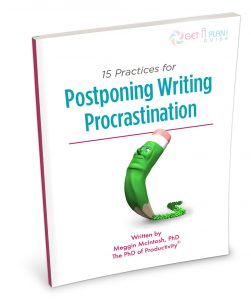Taking Ownership of Your Writing Time by Linda Nilson
 No way around it, being a prolific writer requires discipline. Much of the discipline involves making (not finding) the time to write and reducing distractions during that time.
No way around it, being a prolific writer requires discipline. Much of the discipline involves making (not finding) the time to write and reducing distractions during that time.
- Get up early and start writing, preferably before anyone else in your household is up and around. You can grab your cup of coffee and get right to work.
- Keep your email software closed while writing. If you must have it open, turn down the sound on your computer so you won’t hear new-email alerts.
- You must maintain yourself physically to think and write efficiently. Therefore, get your 8 hours of sleep a night and follow a physical exercise routine. These routines should take priority over everything else in life except food and water.
- Speaking of water, keep a large glass or bottle of it on your desk. When you go into “writer’s trance,” you’ll be more likely to stay hydrated, and you won’t have to leave your desk to get water.
- Streamline your commitment and demands. Say “no” to non-essential activities and affiliations that will gain you little reward. Do not become the person that your church, neighborhood association, clubs, friends, and relatives can always depend on to pick up someone else’s slack. If writing lengthy listserv and blog posts is not your primary writing, keep them short or drop the activity all together.
- Learn to work on your laptop in airports and on airplanes. You will reduce the irritation of a cancelled or delayed flight and make the time fly, whether you can or not.
- Learn to work on your laptop in your physician’s and your dentist’s waiting rooms–and anywhere else where you sit and wait.
- If you easily forget things you intend to do while writing, such as to check a reference or word definition or to make a change in another section of your writing, write down the tasks on a piece of paper, and continue what you are writing.
- Set firm deadlines for yourself to finish a unit of what you are writing. Finishing the unit can be its own reward, or you can reward yourself in some other way that doesn’t consume a lot of time. Honoring self-imposed deadlines gives you a sense of control.
- If you can’t write at home or at your place of work, try other locations that you can get to quickly, such as a library, a coffee shop, or another building on your campus.
Make at least a little time to write every day, and you’ll keep your flow and gain motivation as you watch the pages add up. Remember that writing is like money. Unlike any task you may do for an employer, writing builds your personal wealth.
© Linda B. Nilson, Ph.D., Director, Office of Teaching Effectiveness and Innovation, Clemson University, www.clemson.edu/OTEI
 Do you know any writers who procrastinate? Could that writer actually be you? We writers know perfectly well that we procrastinate, sometimes in very clever ways. In need of tips to help you stop? You’ll want the Get a Plan! Guide® to Postponing Writing Procrastination, part of the Get a Plan! Guides® series.
Do you know any writers who procrastinate? Could that writer actually be you? We writers know perfectly well that we procrastinate, sometimes in very clever ways. In need of tips to help you stop? You’ll want the Get a Plan! Guide® to Postponing Writing Procrastination, part of the Get a Plan! Guides® series.
Inside, you’ll find 15 practices to postpone your writing procrastination. You’ll receive the ideas and inspiration to do your work easier, faster, and in a more focused fashion.




